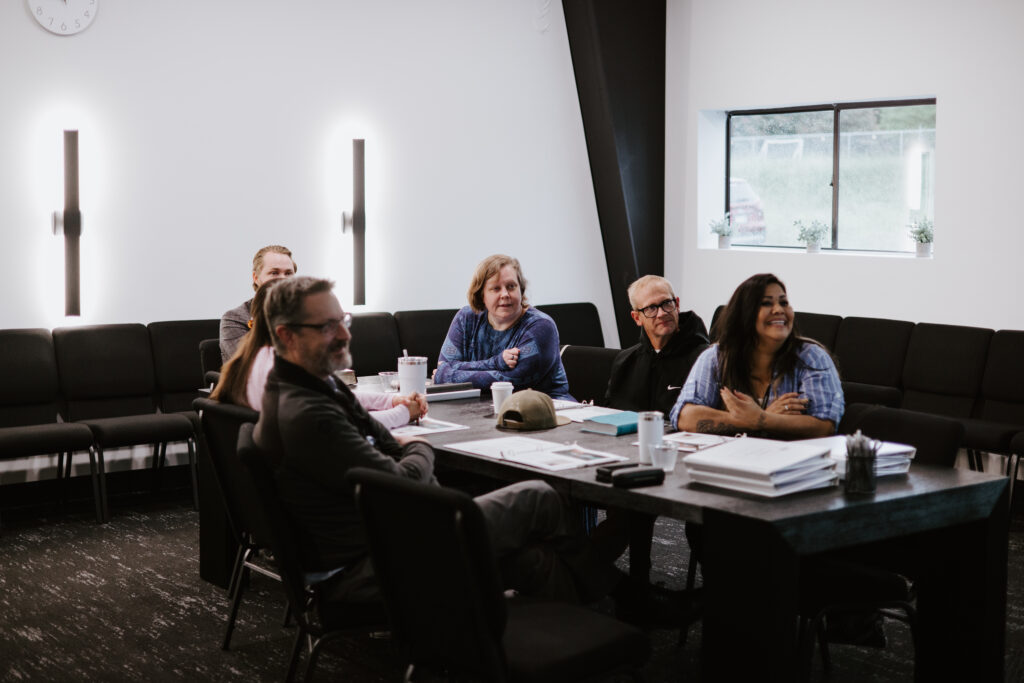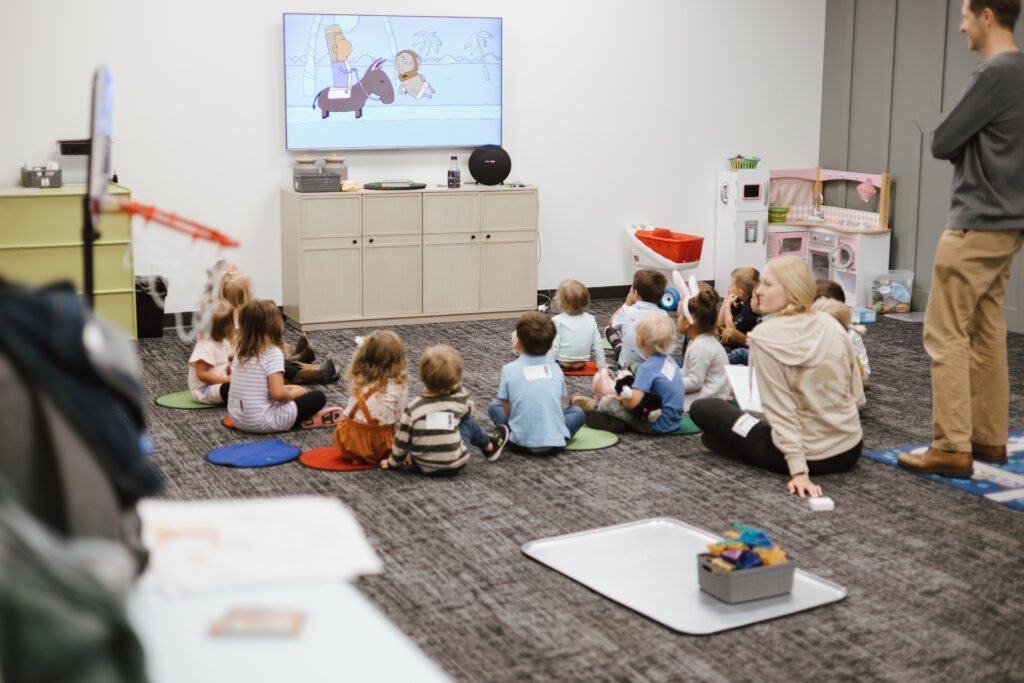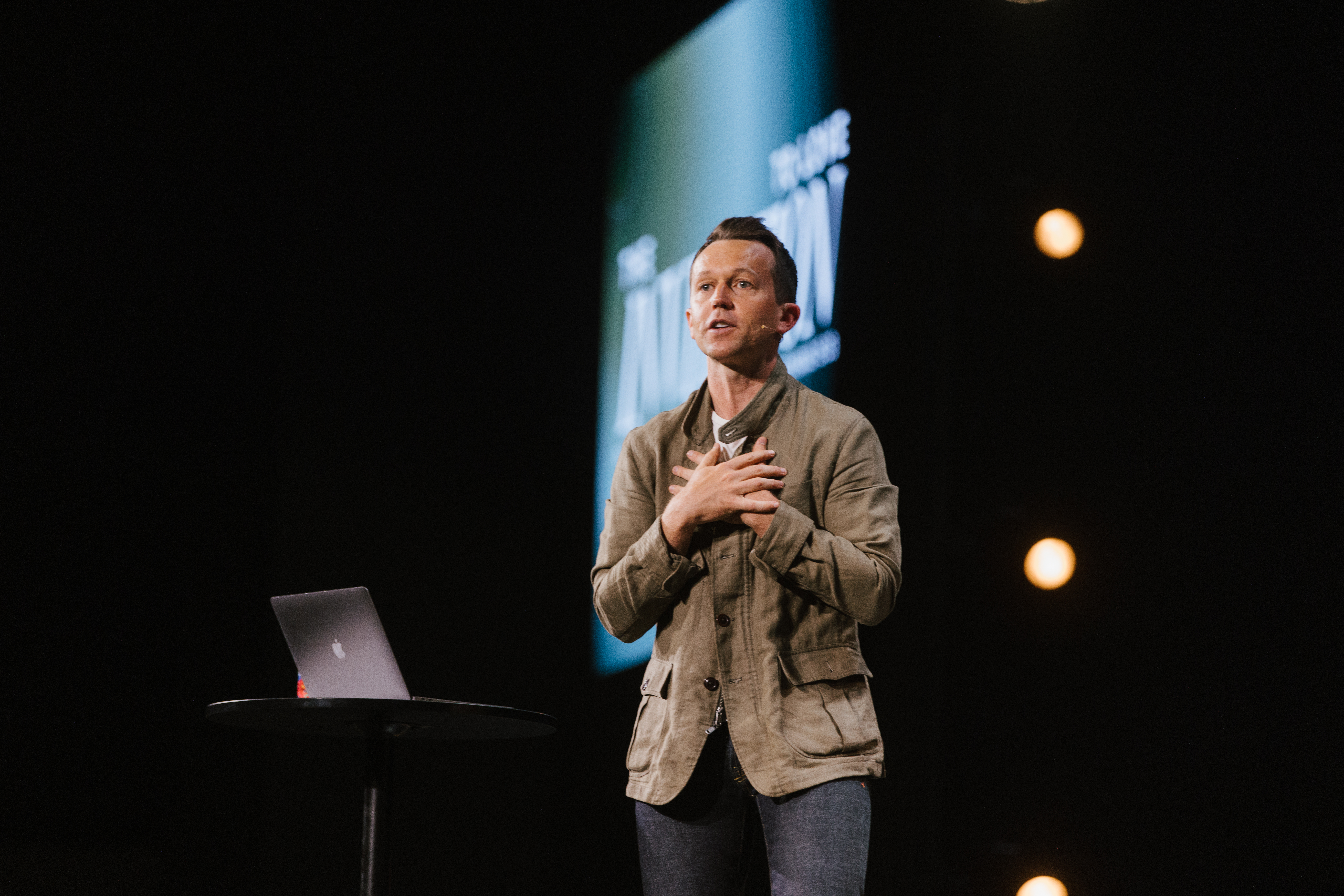The impossible is made possible by God. He will never call us to do something He has not done first.
June 8, 2023





Speaker: David Mitchell
Passage: Romans 15:1-6
An Introduction To Romans 15
It’s great to be with you. My name is David and I get to serve on the Teaching Team here and have had the privilege of doing that for the last eight years or so.
I’m very grateful to be with you. Over the last 18 months or so, we’ve been going through the letter that Paul wrote to the Church in Rome.
Today, we’re in Romans chapter 15, verses one through six. It says, “We who are strong ought to bear with the failings of the weak and not to please ourselves. Each of us should please our neighbors for their good to build them up. For even Christ did not please Himself. But as it is written, ‘The insults of those who insult you have fallen on Me.’ Everything that was written in the past was written to teach us so that through the endurance taught in the scriptures and the encouragement they provide, we might have hope. May the God who gives endurance and encouragement give you the same attitude of mind toward each other that Christ Jesus had. So that with one mind and one voice, you may glorify the God and Father of our Lord Jesus Christ.”
When you spend 18 months in the letter to the Romans, as we have done, you cover a tremendous amount of theological ground and a whole host of teaching. But one of the things I don’t want us to forget, and I want to emphasize, this morning is the setting where this letter was written because the church itself was a miracle.
An Impossible Situation
Here is a group of followers of Jesus, but groups of Jews and Gentiles who grew up in completely different cultures grew up as enemies. Here they are in the center of Rome, controlled by the Roman Empire. This is a church that never should have existed.
If you were to go back 25 to 30 years before this letter was written, before the ministry, death, and resurrection of Jesus, this would have been an impossible situation. There were so many things that could divide this group that it felt impossible.
Here is Paul, in Romans chapter 15, verse one, and he writes to that group of people, and he says, “We who are strong, ought to bear with the failings of the weak.” If you dive into the original text there, the original language, you can translate that accurately: We who are possible, must bear with the impossible, and not please ourselves.
This is an impossible situation before a possible God. There were so many things that should have divided this group of people and that should have prevented them from being in union together. Like their history of warring against one another, their completely different cultures, their completely different histories, their different political stances, the fact that they’re surrounded by this empire of Rome that was a force against them, and these disputes in Romans 14 that Paul writes about.
There are so many things that should have divided this church, and yet somehow, miraculously, they are united. They are an impossible circumstance before a possible God. They are failings of the weak before He who is strong.
Romans chapter 15 verse one is a charge to us as believers that we would fight for unity — fight for one mind, one voice, that we might glorify Him — that we would fight for that above all else. We would stop fighting battles that don’t matter and choose to fight for things that do.
But before you and I can even begin to enter into Romans 15 verse one and say, hey, we who are strong or we who are possible, must bear with the weak or bear with those who are impossible, it’s first worth pausing and recognizing how God has done that for us.
God never calls us to do something that He will not first do. He who is strong, He who is possible, has first carried the impossible. That is what God is always in the business of doing.
Maybe this morning, you came to church, and maybe you’re dealing with a circumstance that feels impossible and you are bringing it before a God who makes all things possible. A God who carries the weak in His strength.
Becoming United In Christ’s Love
So this group of people in Rome is united by something that cannot be divided, right? Romans eight says, “I am convinced that neither death nor life, nor principalities, nor powers, nor angels, nor demons, nor things present nor in the past, can separate us from the love of God.”
Church, we cannot be separated from the love of God. And in response, we must not be separated from one another. The response to the unifying force of the love of God is a responsive obedience to put His things before our own. That is the business God has always been in. He has always been in the business of doing impossible things.
Sometimes we call out and say, I’m just praying for God to do something supernatural. Church, God only does things that are supernatural. That is the only thing He can do. It is not that He chooses at times to do impossible things, He is in the business of doing impossible things.
We see it back in Genesis chapter 15 at the beginning of the Scriptures, where Abraham, who is in his old age, and his wife, Sarah, who is also in her old age, have no heir and no children. God speaks to Abraham in Genesis chapter 15. He says, “Through you, all the nations of the earth will be blessed. Your descendants will be as numerous as the stars in the sky.”
He is making this covenant with Abraham. That is a possible God dealing with an impossible situation. God is speaking with Abraham, who is there in this place wondering how on earth this is going to come to fulfillment.
God’s Covenant With Abraham
As a quick tangent, what God does in Genesis 15 is He commands Abraham to get the set ready for them to make a covenant. He says, Abraham, I want you to take a bunch of animals, and I want you to divide them and put them one here and one there. The point would be that then the two who were making the covenant together would walk through the sacrifice together. That’s what it means to bind a covenant in this way.
But something miraculous happens in Genesis chapter 15. Abraham prepares the setting for the covenant to be made. And then it says that God sends Abraham into a deep sleep, and then the Spirit of God, the Flame, passes through the sacrifice.
Now, let me ask you this, why would you make a covenant with someone who’s fast asleep? Just as a tip, if you’re ever at the negotiating table and you’re signing a document and the person on the other side of the table is asleep, you might not be confident in them holding up their end of the bargain.
If you’re buying a house, you’re ready, you’re at the final stages, and the other person is asleep. And you’re like, are you sure you know what you’re signing up for here? So why would God make a covenant with a man who is asleep? Because the covenant didn’t depend on the man. The covenant only depended on God.
That is a possible God making a covenant with an impossible situation, saying through me, the impossible will be made possible. “Through you, Abraham, all the nations of the earth will be blessed.”
Church, before we get into the responsibility that we have in response to Him and in response to His covenant, I just want to encourage you this morning that if you find yourself in an impossible situation, the invitation is to come before a possible God. Just like Abraham when he fell asleep, you can rest in who He is.
Growing In Strength and Maturity
So he says, “We who are strong must help those who are weak, remembering that of course you first did that for us.” Consider all the times when God has stayed with you in your failing and in your weakness.
The invitation of Romans 15 is that we would be a reflection of who Christ has been to us. So he says, “We who are strong.” The first reality of Romans 15 is this — you and I are designed as disciples of Jesus to grow in strength. The other translation of that is, “We are designed to grow in maturity.”
We live in a culture right now that celebrates staying in forms of adolescence or staying in forms of childishness. We live in a culture that celebrates people looking for ways where they are victims of something, versus what the Scriptures teach us. We don’t have that luxury. We are called to grow in maturity. We are called to grow in strength.
Romans five writes about the strength of character. Later on, Romans five writes about the strength of confidence. Romans eight writes about the strength of His love. You and I, as disciples of Jesus — as followers of Him — are called to grow in strength in character, strength in our confidence in Him, and strength in our assurance of His love. We are not called to remain childish. We are called to grow into maturity.
In First Samuel chapter 23, David is fearing for his life. King Saul is pursuing him. He finds himself in a place of fear. 1 Samuel 23:15 says, “While David was in Haresh in the wilderness of Ziff, he saw that Saul had come out to take his life. Saul’s son Jonathan came to David in Haresh and strengthened his hand in God.”
What it looks like to grow strong, is that we would grow strong in character, we would grow strong in our confidence and assurance in Him, we would grow strong in His love, and we would be in relationship with those who will come to us when we find ourselves weak in the wilderness and they will strengthen our hands in God.
That is what a church exists for. It exists so that we who are strong might bear with the failings of the weak.
In First Corinthians nine, Paul talks about his own physical body, and he says, “I discipline my body to grow it in strength.” Church, as followers of Jesus, we are called to grow strong, physically, intellectually, emotionally, and spiritually. We are called to be strong.
There’s a reality when we read Romans 15 verse one, and it says, “We who are strong ought to bear with the failings of the weak,” every one of us in the room assumes that we’re the strong ones, right? That’s me.
The reality is, we have to also take ownership of places where we are weak. Again, church, Romans 15, Romans 14, and before that, this is not talking about being apathetic to sin. It’s not talking about that failing. It’s talking about those places of spiritual immaturity where we are fighting disputable matters. We are fighting for things that don’t matter.
Seeking Unity Above All Else
What Romans 15 is urging us to step into is to leave childish ways behind, but it is also putting the responsibility on the strong and the mature to seek unity above all else. It says to bear with the weak. The translation of that is the failings, the lack of strength, and the lack of power that is going on here.
This is not about being ambivalent about someone’s sin. That has nothing to do with this. If there’s sin going on in someone’s life and you, as a follower of Jesus, are aware of that, there is a responsibility to come alongside, in compassion, but with the Spirit of God’s voice ever present to bring about conviction. That’s true.
This is about the pursuit of unity and what it says in bearing with the failings of the weak. It doesn’t say appease the weak. It doesn’t say ignore the weak. It doesn’t say praise the weak. It says to bear with them. In verse two, it says that you would build them up.
Romans 11 says do not be puffed up with pride. To build somebody up is different than somebody being puffed up. To be puffed up with pride is to be filled with yourself. Romans chapter 15 says to be built up is to be filled with Him.
Our job with our fellow disciples, with our brothers and sisters in Christ, is not to puff them up with pride and fill them with themselves. It is to build them up and ensure they are filled with Jesus. That is what it means that we who are strong ought to bear with the failings of the weak and not to please ourselves.
In other words, to be a mature disciple of Jesus means that each of us has to be cognizant and aware of where our preferences lie and understand this is not something that your word details, this is a preference of mine. I need to learn to lay this down.
Romans 15 is about following the model and the pattern of Christ. It says in verse one, that you and I are not to please ourselves. In verse three, it says that Christ did not please Himself. Verse seven says we are to accept one another because Christ has also accepted us. We are to live in response to how He has treated us.
So the question we have to ask ourselves is, where has God given you strength? And how might that be extended to those who are weak?
Romans 14 begins with, “Accept those who are weak.” Romans 15 begins with, “Bear with those who are weak.” In Romans 14, that we studied together a few weeks ago, Paul explains how essential this is in verse 19. He says, “Let us, therefore, make every effort to do what leads to peace and to mutual edification. Do not destroy the work of God for the sake of food.”
What Paul is teaching us in Romans 14 and 15 is that disunity and fighting over things that don’t matter will destroy the work of God. The church is not here to destroy the work of God, the church is here to magnify the work of God.
This is about this posture toward those brothers and sisters in Christ that we are in a relationship. My job is to pursue peace and edification so that I might build them up in the things that God is already doing in their life.
Don’t Give In To Division
Paul, is quite clear in Romans 15 that this is not easy work. That’s why he quotes Psalm 69. He says, “The insults of those who insult You have fallen on me.” Psalm 69 was originally written by David, and the original context of that was David in a place of oppression, saying to God, “God, the insults that have fallen on you have now fallen on me.”
In Romans 15. Paul is taking it and flipping it and saying that this is God speaking to us saying, hey, Church, the insults that have fallen on you have fallen on Me.
There are times when we can let our insults and our offense divide us. What Romans 15 is saying is we need to be very, very careful. We cannot let things divide us that were not intended to be divisive.
It means that we are to be full of conviction about what matters to God. Romans one through 14 has been very clear about those things. It means that we are to lay down things that are places of preference.
Chapter 14 verse 20 says, “Do not destroy the works of God for the sake of food.” Could you imagine the Church in Rome hearing this for the first time? I often think about that as somebody who gets up and teaches. I teach and then I get off the stage and typically people say nice, encouraging things. It’s just a beautiful system. People may say something like, “Great job, that was a great message.”
I picture this letter being read and at the end, someone saying nice letter. “That’s pretty good.” But he’s writing this to convict them. There would have been people in that church that day who, for that preference around food — whether it was sacrificed to idols or not — were allowing that to destroy the work of God and divide them.
The Journey Of Endurance
We can take that passage and we can say, do not destroy the work of God for the sake of blank. And we have to be very intentional about what goes in that blank. Unless it is something that God has clearly spoken to us about, and said, “That is a line in the sand,” then the invitation of Romans 15 is to lay that stuff down.
It says in verse three that He did not please himself. By becoming human, Jesus traded the praises of angels for the insults of men. That is what He stepped into. On the night that He was betrayed, He prayed “Not my will, but Your will be done.” It wasn’t that Jesus didn’t have a will. It wasn’t that Jesus didn’t have a preference. But at all times, He was prepared to lay that down for the purposes of God.
If Jesus had to pray that prayer, how much more must I need to pray it? I must begin by acknowledging my will and my preference. It’s not simply about saying, “God, I want your will to be done.” But it’s first having the courage to say, “God, you see this will of mine? I don’t want that anymore. I want what you have.”
Then in Romans, he talks about the endurance and encouragement of the Scriptures, and he talks about the God who gives endurance and encouragement. The life of a disciple of Jesus is a journey of endurance.
We live in a culture where we like microwave endurance. We like Hot Pocket endurance. Or Pop-Tart endurance. Anyone had a Pop-Tart this morning? I was just reading last night about Pop-Tarts because you start getting ready to teach and Wikipedia becomes your friend. You know that thing where you’re like, hey, it’s 9:30. I’m going to go to bed and then at 11:45 you’re like, “JoEllen, did you know that Pop-Tarts were invented in 1958?”
No, they were invented in 1964. And they only came to England, where I’m from, in 1990. Took you guys 26 years to let us have that good stuff. I mean, we sent the Pilgrims here hundreds of years ago. We didn’t hear anything. No letters, no pictures, no taxes. You never sent any. You sent us nothing. And then in 1990, you sent us Pop-Tarts. The highly flammable sugary breakfast things that burned down many English homes.
We talk about the endurance and encouragement that comes from the Scriptures. And then I go to the Scriptures to find out what endurance looks like. And it looks like hundreds of years of the people of Israel being in Egypt. 430 years. It looks like Joseph being in prison for many years. It looks like Abraham waiting years and years and years for the promise to be fulfilled.
I look at that, and I say, ‘Wait a minute, I see the endurance. But now I feel a little discouraged.” Because if you’re anything like me, church, I want endurance to be quick and fast. We live in that culture. People are like, man, I’m in the dark night of the soul. And you ask, when did it start? And they respond, at about 11:45 this morning. I’ve been in it for the last 45 minutes.
Then we read the endurance of the Scriptures and we see years and years of patiently waiting and enduring, holding on to a promise. That if anyone else had given the promise, you would let go. But when God gives a promise, He keeps it.
So Abraham was able to endure because he knew that when God made the covenant, Abraham himself was asleep. Abraham was able to know, “This covenant is not dependent on me. It’s dependent on him, and I can trust that.”
Church, we are called to a life of maturity. We are called to a life of strength. We are called to a life of endurance. It says in Romans 15 that we might have the same attitude and mind of Christ. So that we might, with one mind and one voice glorify the God and Father of our Lord Jesus Christ. What Paul is teaching us in Romans 15:6 when he begins with, “so that,” is that for us to have one mind and one voice, it is dependent on what came before.
If you and I want to come together and be of one mind and one voice worshiping and glorifying Him, we have to take Romans 15:1-5 seriously. We have to be the kind of people who choose to not please ourselves but to please Him.
Remember, in verse two or three of Romans 15, he says “to bear with the failings of the weak, and to carry your neighbors and to build them up.” Remember when the people come to Jesus and say, “Who then is our neighbor?” He tells them a parable about their enemy. They say, “Who then is our neighbor,” and He tells them the parable of the Good Samaritan. He tells them a story about our enemy.
Church, the invitation of the Gospel is that you and I, who are rooted and grounded in love, who are mature in Christ, might be an extension to the world of God’s goodness to us in the places where God has made us strong. That is what Romans 15 is about.
When I think about my preferences, my things, the things that I’m prepared to divide about, in Romans 14:19, they were ready to divide an impossible thing that God had made possible. In this church in Rome, they were prepared to divide over food. We might think that’s ridiculous. But church, we divide over things way more ridiculous than that.
Each of us needs to come before God and say, “God, convict me of the things that matter and help me to let go of the things that don’t. That we might with one mind and one voice glorify the God and Father of our Lord Jesus Christ.”
So the challenge and the invitation of Romans 15 is this. Where you have strength, would you look for those around you who have weakness? And would you bear with them so that they might be built up? And where you have weakness, would you look around for those here who have strength and say, would you bear with me? Would you carry me? To help me mature and grow into the fullness of who God has created me to be? Let’s stand together.
Benediction and Closing Prayer
Father, as we come before this text and think about all that we have learned and studied together through Romans, we’re taken to so many different places. What we see in your heart is that You are forming a people who were formerly impossible and now made possible. A people with one mind and one voice glorifying You. A people united by Your covenant of grace. A people who are strong who say that we are more than conquerors through him who loved us.
God, would you help us this week to grow in strength? Would you help us to bear with the failings of the weak, and where we are weak, would you help us to invite the strong to come alongside us? So that we might experience a unity here that is only possible because of you. We love you and we worship you in Jesus’ name, amen.
Leave a Reply Cancel reply
the vintage weekly
News, updates, and events sent directly to your inbox every Thursday morning.
Stay up to date with what is going on at Vintage by subscribing to the Vintage Weekly - our weekly newsletter - and downloading the Church Center app. These resources enable us to keep you updated of upcoming events, opportunities, and alerts such as weather cancellations.
SUBSCRIBE TO VINTAGE WEEKLY
DOWNLOAD CHURCH CENTER APP
©2024 vintage city church All Rights Reserved
designed BY Amanda Doherty press, llc
back to top
get the news
Subscribe to the Newsletter
About
Statement of Faith
Our Team
Photo & Video Policy
Prayer Request
Capture Your Miracle
Find us
1501 Academy Court, #101
Fort Collins, CO 80524
970-779-7086
info@vintagecitychurch.com
Thank you for submitting your message. We will be in touch shortly.
